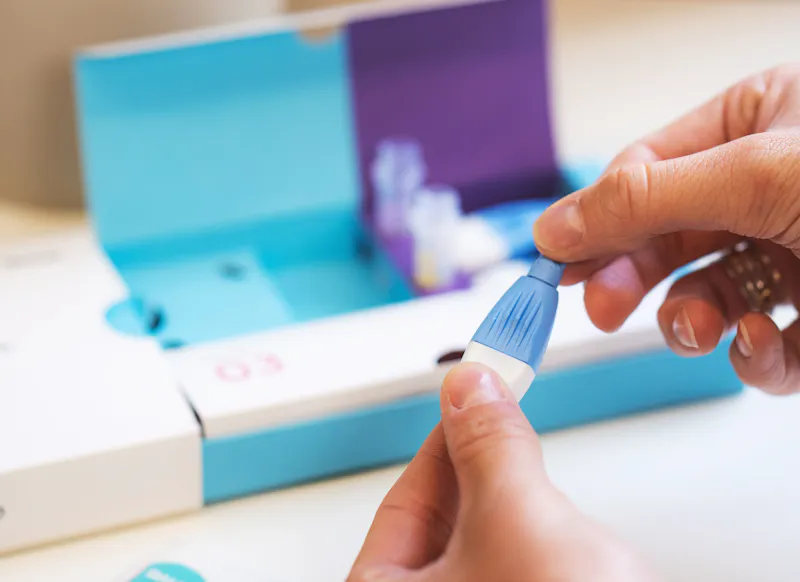How to test your thyroid function
What's covered?



Your thyroid gland produces hormones that help control your metabolism. If you don’t make enough of these hormones, it’s called hypothyroidism (underactive thyroid). If you make too many of these hormones, it’s called hyperthyroidism (overactive thyroid). An autoimmune disease sometimes causes thyroid disorders. If your thyroid isn’t working correctly, it can cause tiredness, weight gain or loss, and mood problems. A blood test can check for a thyroid disorder and autoimmune thyroid disease.
What is a thyroid?
Your thyroid is a small gland in your neck. It produces hormones that help control your metabolism — body functions that keep you alive and how your body uses energy. These hormones are called triiodothyronine (T3) and thyroxine (T4). These hormones are controlled by thyrotropin-releasing hormone (TRH) and thyroid-stimulating hormone (TSH).
What is a thyroid function test?
A thyroid blood test checks how well your thyroid is working. It can also be used to monitor how well your thyroid is responding to thyroid disease medications. It does this by measuring your thyroid hormones.
Should you do a thyroid function test?
If any of your thyroid-related hormones are out of balance, it can lead to a thyroid disorder and cause many symptoms.
Depending on whether your thyroid is overactive or underactive, these can include:
- fatigue
- difficulty concentrating
- dry skin
- brittle hair and nails
- feeling sensitive to the cold
- increased irritability or anxiety
- depression
- constipation or diarrhoea
- muscle aches, cramps, or weakness
- low sex drive (libido)
- irregular periods or heavy periods
- weight gain or loss despite a normal or increased appetite
- excess sweating and heat intolerance
- shaking and tremors
- heart palpitations
You might want to check your thyroid health if you're experiencing any of these symptoms, as they might indicate an underactive thyroid (hypothyroidism) or an overactive thyroid (hyperthyroidism).
If you have thyroid disease, your GP might advise monitoring your thyroid function to check if any medications you take are working.
An underactive thyroid happens when your body doesn’t produce enough thyroid hormones, leading to the slowing down of your bodily processes. Whereas an overactive thyroid happens when your body produces too many thyroid hormones and your metabolism is overstimulated.
It's also common for thyroid disorders to run in families, so it's worth testing your thyroid function if you think you might be at risk.
How to test your thyroid function
You can test your thyroid function using a blood sample. The two main ways to collect a blood sample are:
- A finger-prick thyroid blood test — using a lancet, you can prick your finger and collect a small blood sample at home. You get online results in 48 hours and a personalised GP report.
- A venous blood test — if you'd prefer not to take your sample at home, you can visit a nurse at a clinic. They’ll use a needle to puncture a vein, usually in your arm, to collect your blood sample.
What's included in a thyroid function test?
A thyroid function test will usually measure your levels of:
- T4 or FT4
- FT3
- TSH
A more advanced test will also test for the presence of any thyroid antibodies that could be causing an autoimmune disease. This might check your levels of:
- thyroid peroxidase (TPO/PEX)
- thyroglobulin antibodies (TgAb)
It's important to note that the presence of these antibodies in your blood doesn't automatically mean you have autoimmune thyroid disease — but it can indicate an increased risk of developing one in the future.
Some vitamins and minerals are essential for your thyroid to function properly — like vitamin D, vitamin B12, vitamin B9 (folate), and iron. A nutrient deficiency can sometimes mimic the symptoms of a thyroid disorder. If possible, it's a good idea to test your thyroid hormones and these nutrients. In some cases, you might need to take supplements.
What can affect your thyroid function results?
It’s important to note that certain factors might affect your thyroid function results. This includes:
- Medications — some medications can interfere with your results, so it's important to tell your doctor about any drugs you take.
- Pregnancy — being pregnant can also influence your results. So if you're pregnant, make sure to discuss this with your doctor.
- Time of day — your circadian rhythm (internal body clock) can slightly affect your TSH levels. This means that the time of day you do your blood test could affect your results. TSH typically peaks in the early morning hours, drops to lower levels mid-morning, and increases again in the early evening. How much your levels will change depends on you as an individual.
Understanding your thyroid blood test results
Your thyroid blood test results contain many biomarkers — we help you understand these by breaking them down.
TSH (thyroid-stimulating hormone) results
The normal range for TSH is:
- between 0.27-4.2 mIU/L
If these levels are low, it could indicate an overactive thyroid. If these levels are raised, it could indicate an underactive thyroid.
T4 (thyroxine) results
T4 levels can be tested in two ways — 'total' T4 or 'free' T4 (FT4). FT4 is usually measured as it's the amount of T4 your body can use. The normal range for:
- total T4 is between 66-181 nmol/L
- FT4 is between 12-22 pmol/L
If these levels are low, it could indicate an underactive thyroid. If these levels are raised, it could indicate an overactive thyroid.
T3 (triiodothyronine) results
T3 is about four times stronger than T4 and is responsible for most of the effects of thyroid hormones. The vast majority of T3 in the blood is bound to proteins, and the rest is unattached or ‘free’. Most laboratories will only routinely measure and report FT3 results. The normal range for:
- FT3 is between 3.1-6.8 pmol/L
If these levels are low, it could indicate an underactive thyroid. If these levels are raised, it could indicate an overactive thyroid.
TPOAb (anti-thyroid peroxidase) results
The normal range for TPOAb is:
- between 0-34 kIU/L
Raised TPOAb levels signify that the cause of your thyroid disease could be autoimmune — like in Hashimoto's disease (autoimmune thyroiditis). These antibodies attack your thyroid and cause an underactive thyroid (hypothyroidism). Up to 95% of people with Hashimoto's have TPO antibodies in their blood, making it a good marker for diagnosing this disease.
TgAb (anti-thyroglobulin antibody) results
The normal range for TgAb is:
- between 0-115 kU/L
Raised TgAb levels might be present if you're suffering from an autoimmune thyroid disease — about 60-70% of people with Hashimoto's disease will have raised TgAb levels. It's infrequent for a patient to have raised TgAb levels and TPOAb levels in the normal range. For this reason, a TPOAb test is more widely used to diagnose autoimmune thyroid disease.
Autoimmune thyroid diseases
An autoimmune disease is when your immune system mistakenly attacks your body — in this case, thyroid antibodies attack your thyroid. This can lead to a thyroid disorder.
Types of autoimmune thyroid diseases include Graves' disease (which can cause an overactive thyroid) or Hashimoto's disease (which can cause an underactive thyroid)
Treating thyroid disorders
If your levels indicate you have a thyroid disorder, your doctor will work out any underlying causes and devise a treatment plan.
An underactive thyroid is typically treated with levothyroxine — a thyroid hormone replacement tablet.
An overactive thyroid is usually treated with either medication, radiation, or surgery.
American Thyroid Association and American Association of Clinical Endocrinologists Taskforce on Hyperthyroidism and Other Causes of Thyrotoxicosis, Bahn, R. S., Burch, H. B., Cooper, D. S., Garber, J. R., Greenlee, M. C., … & Rivkees, S. A. (2011). Hyperthyroidism and other causes of thyrotoxicosis: management guidelines of the American Thyroid Association and American Association of Clinical Endocrinologists. Thyroid, 21(6), 593-646.
Abalovich, M., Amino, N., Barbour, L. A., Cobin, R. H., De Groot, L. J., Glinoer, D., … & Stagnaro-Green, A. (2007). Management of thyroid dysfunction during pregnancy and postpartum: an Endocrine Society Clinical Practice Guideline. The Journal of Clinical Endocrinology & Metabolism, 92(8_supplement), s1-s7.
Casey, B. M., Dashe, J. S., Wells, C. E., McIntire, D. D., Byrd, W., Leveno, K. J., & Cunningham, F. G. (2005). Subclinical hypothyroidism and pregnancy outcomes. Obstetrics & Gynecology, 105(2), 239-245.
Garber, J. R., Cobin, R. H., Gharib, H., Hennessey, J. V., Klein, I., Mechanick, J. I., … & Woeber for the American Association of Clinical Endocrinologists and American Thyroid Association Taskforce on Hypothyroidism in Adults, K. A. (2012). Clinical practice guidelines for hypothyroidism in adults: cosponsored by the American Association of Clinical Endocrinologists and the American Thyroid Association. Thyroid, 22(12), 1200-1235.
Scobbo, R. R., VonDohlen, T. W., Hassan, M., & Islam, S. (2004). Serum TSH variability in normal individuals: the influence of time of sample collection.The West Virginia Medical Journal,100(4), 138-142.
Sturgess, I., Thomas, S. H., Pennell, D. J., Mitchell, D., & Croft, D. N. (1989). Diurnal variation in TSH and free thyroid hormones in patients on thyroxine replacement.European Journal of Endocrinology,121(5), 674-676.
Sviridonova, M. A., Fadeyev, V. V., Sych, Y. P., & Melnichenko, G. A. (2013). Clinical significance of TSH circadian variability in patients with hypothyroidism.Endocrine research,38(1), 24-31.